A Walk Through the Woods Posted by Serena on Nov 18, 2015 in Vocabulary
Inspired by a lovely walk near our home in Valdantena I wanted to try and find an Italian autumn poem. However, unable to unearth anything that seemed to fit with what I had in mind, I eventually decided to write something myself, assisted by Geoff’s photos. Eccolo:
1. Una mattina apriamo gli scuri e scopriamo che durante la notte il paesaggio tutt’intorno a noi ha cambiato aspetto come per incanto. Le verdi montagne si sono trasformate in un tripudio di colori fiammanti: gialli, ocra, ruggine. I loro contorni si stagliano netti contro il cielo terso di un azzurro intenso.
1. One morning we open the shutters to discover that during the night the landscape all around us has changed as if by magic. The green mountains have transformed themselves into a riot of flaming colours: yellows, okras, russets. Their contours stand out crisply against the clear sky of intense blue.
2. Il sole è ancora abbastanza caldo malgrado sia novembre inoltrato, e così decidiamo di fare una passeggiata nei boschi.
2. Despite the fact that we are well into November, the sun is still fairly warm, so we decide to go for a walk in the woods.
3. Il sottobosco è ricoperto di foglie morte e di castagne, molte ancora racchiuse nei loro ricci spinosi. Sono così invitanti, che non possiamo resistere e ci riempiamo gli zaini dei frutti saporiti.
3. The undergrowth is covered with dead leaves and chestnuts, many of which are still enclosed in their spiky shells. They are so inviting, that we can’t resist them and fill up our backpacks with the tasty fruit.
4. Il ruscello scorre tranquillo tra sassi rotondi ed enormi massi, contornato da olmi e pioppi vestiti nei loro colori autunnali.
4. The stream flows tranquil amongst round stones and huge boulders, surrounded by elms and poplars dressed in their autumnal clothes.
5. I tronchi bianchi di giovani betulle creano un motivo geometrico, mentre il sole si infiltra fra le loro chiome rade.
5. The white trunks of young birch trees create a geometrical pattern, and the sun sneaks through their sparse foliage.
6. E’ ora di fare una piccola sosta, ed ecco apparire un vecchio casone in sasso. Se un folletto uscisse dalla sua porta diroccata, ci sembrerebbe la cosa più naturale del mondo.
6. It’s time to take a short break, and at that point an old stone barn appears. If an elf came out of its derelict door, it would seem the most natural thing in the world.
7. Le creature magiche non mancano di sicuro: ecco che un viso contorto dal riso ci guarda dal tronco di un castagno secco.
7. There’s no lack of magic creatures, that’s for sure: here, a face contorted by laughter watches us from the trunk of a dead chestnut tree.
8. Il sentiero sbuca nuovamente all’aperto e ci torna incontro il cielo turchino incorniciato dai profili delle montagne.
8. The track leads back out into the open, and we are greeted by the turquoise sky framed by the silhouette of the mountains.
9. Da un’apertura fra gli alberi vediamo lo scorcio del nostro paesino: due strisce di case in sasso coi tetti in tegole rosse. Siamo quasi a casa.
9. From an opening through the trees we catch a glimpse of our little village: two lines of stone houses with red tiled roofs. We’re almost home.

Build vocabulary, practice pronunciation, and more with Transparent Language Online. Available anytime, anywhere, on any device.



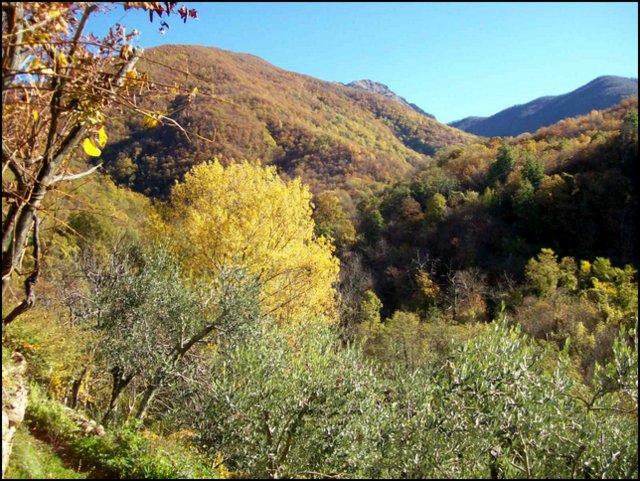
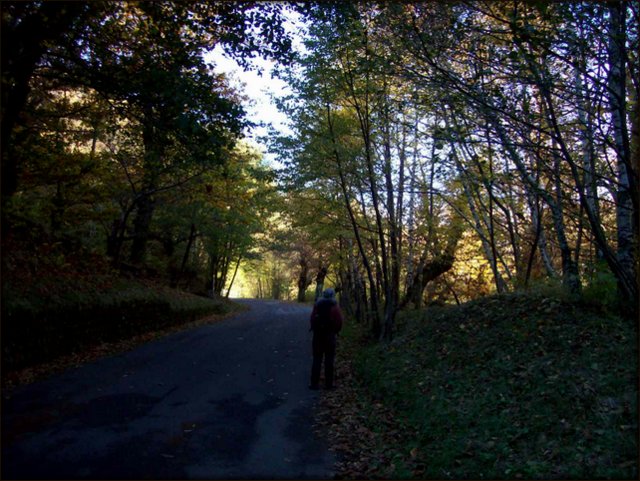
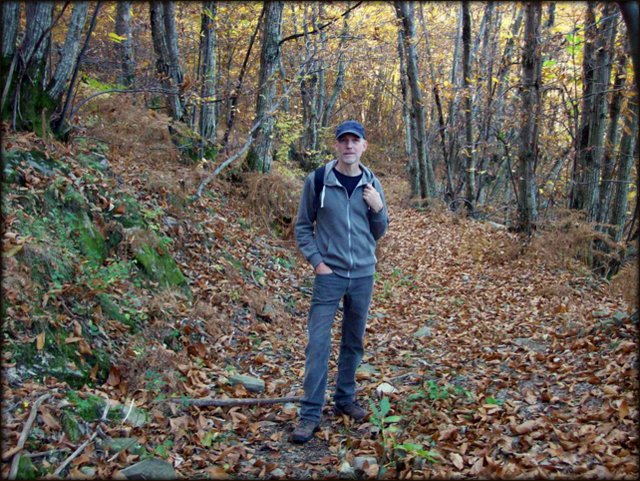


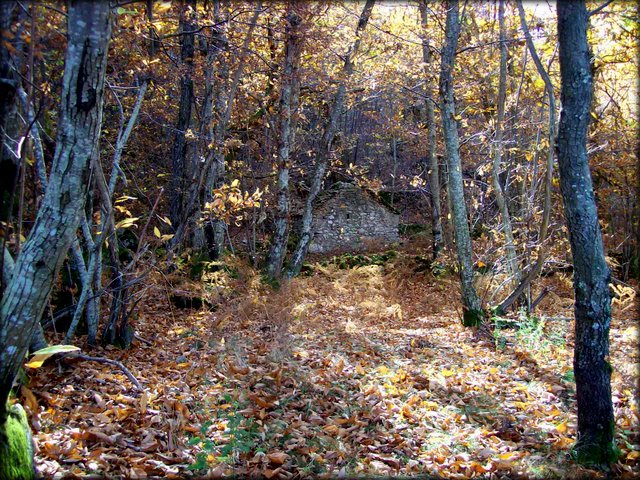

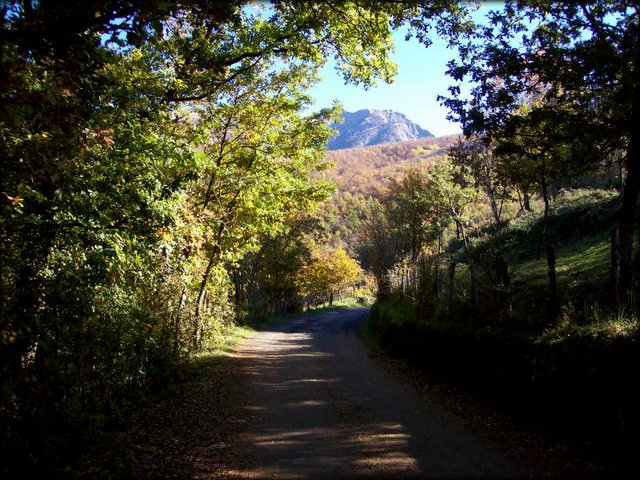
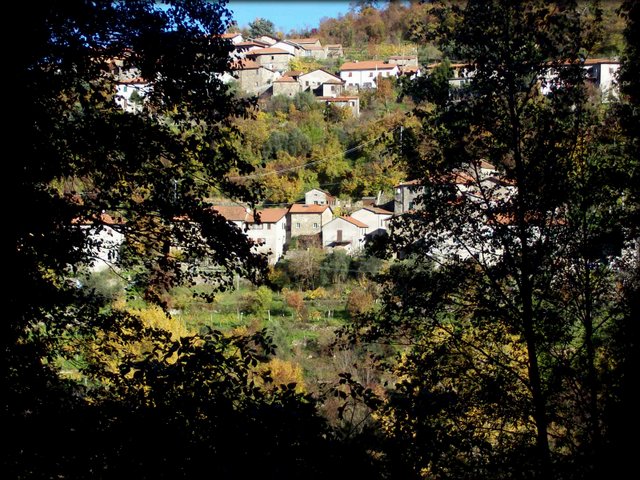

Comments:
Linda Caston:
bellissimo. Grazie
Elaine:
Bella descrizione e molte parole nuove da imparare!
Gary Donovan:
Thanks a thousand times !
Absolutely stunning.
Gary
علي مهدي:
Bellissimo. Grazie.
Ann Finlay:
Grazie di avermi trasferito, come per incanto, nei vostri boschi autunnali. Mi è piacciuto molto la nostra passeggiata insieme con un fotografo cosi bravo.
Chippy:
Per me, molte parole nuove! Pero`, che bella poesia – Grazie Serena!
Julie:
Una bella storia . Grazie!
Joseph T. Madawela:
beautiful. The fall colors must be beautiful much better than here in new york city where you know its fall by the warmer coats worn by the muggers
Bill Auge:
Ah, questo blog me ha portato ricordi piacevoli
MADELINE PARELLA:
so beautiful—–bellesima
MADELINE PARELLA:
so beautiful—–love your stories—Grazie
Lesley:
La zona dove abitate mi sembra bellissima
Auguri,Lesley
Andrej:
Salve Serena!
Questa storia è una vera poesia. Hai un vero talento per discrivere le cose.
Saluti da Andrej
John Madrid:
Apprezzo molto le storie sui vostri blog e vi ringrazio per averci dato la traduzione che altrimenti sarebbe difficile per alcuni di noi.
Mille grazie
John Madrid
Lorita Winfield:
What a beautiful blog! What a good teacher you are!
I am loving these newly discovered lessons. Thank you so very much.
Lorita
Serena:
@Lorita Winfield Grazie Lorita e benvenuta!
Bahia:
Ciao,
Your blog popped up when I was looking for passato prossimo o imperfetto. I love it! Thank you very much and as previously mentioned the translation is extremely helpful for people like me learning your beautiful language in Londra! I will try to translate from the English which will improve my written Italian – spero!
Bahia da Londra
Serena:
@Bahia Grazie Bahia e buona fortuna!
judi:
First, the good. I really like your blog, as I’ve mentioned in an earlier comment. The variety of topics and the creativity not only keeps it interesting, but affords me the ability to learn more than the language.
Second, the not so good. I do use this to learn the language. I look at the syntax, the ordering of the words, where prepositions are used after infinitives, what seem to be idioms. I’m not only looking for a true flavor of the language, but how words and sentences are ordered for the harder rules of it.
So I find that not always is the translation true to what the Italian seems to be. I realize that how you’d say something in English, isn’t how you might say it in Italian, but I think that with so many of us using the blog to learn, paraphrasing, altering and adjusting the translation hinders more than helps.
For instance, in section 1:
The Italian: Una mattina apriamo gli scuri e scopriamo
The English: One morning we open the shutters to discover
Now I know the difference. Literally it’s “One morning we open the shutters and we discover….” however those who are beginners might be confused, thinking there is some rule there they aren’t grasping.
Another example, this in section 2:
Italian: Il sole è ancora abbastanza caldo malgrado sia novembre inoltrato,
English: Despite the fact that we are well into November, the sun is still fairly warm
You’ve reversed the phrases, more or less. I can read 50% of everything without having to use Google translate to help with the gist of what’s being written. But for a beginner, this small thing might be enough to throw them off.
This happens often enough that it’s irking me a bit, although perhaps I’m the only one and making much ado about nothing, in light of what is otherwise a really great blog.
But I wonder if you might translate a little closer to the Italian, perhaps, please, even if it doesn’t sound quite as fluid in English.
Thank you
Judi
Geoff:
@judi Ciao Judi, e grazie per il tuo commento.
Let me explain our stance regarding translations:
Firstly, the Transparent Italian Language blog is definitely not for beginners. There are hundreds of Italian language sites that cater for beginners and for this reason we have specifically chosen to provide something for intermediate/advanced learners.
In fact we receive a lot of positive feedback from intermediate/advanced learners who are happy to have found a site that caters for their needs.
Another of our strengths is that we focus strongly on colloquial, rather than dictionary Italian. Once again, there is a serious deficit of sites, and to that matter language classes that deal with the real, everyday language spoken by Italians in Italy.
This leads me on to my second point: I fully appreciate that people need a clear understanding of how Italian grammar and syntax works, but in our many years experience as language teachers we have observed that an over attachment to literal translations becomes an obstacle in progressing beyond the initial stages of language acquisition.
A vital step in becoming a fluent speaker of Italian is leaving the literal (very often ugly and nonsensical) translations behind and literally thinking directly in Italian.
Italian mostly translates badly into English, and very often doesn’t translate at all. Learners need to accept the inherent meaning behind words or phrases, just as they do in their mother tongue, rather than insisting on finding an exact equivalent.
As for syntax, well Italian is far more flexible in this respect, and their are numerous ways in which to order words in phrases. Some sound okay when translated more or less literally into English, many sound ridiculous, becoming what we call Italianese. It’s our policy to avoid Itlianese at all costs.
I do appreciate that some learners find it harder to let go of literalism than others. Personally, I mostly learnt Italian from my friends, family, and just everyday life. When I speak in English to English people I sometimes throw in Italian words than express what I want to convey without even thinking about it. When asked what those words mean I often struggle to translate them because I haven’t learned then from a course or dictionary but from real life contexts where they convey something relevant.
Obviously, I have the privilege of living here, and I use Italian every day for just about everything (although Serena and I mostly communicate in a mixture of English and Italian!).
This is a luxury that not many of our readers have, but we do our best to try and provide them with contexts, insights and some of the basic skills that are so often overlooked by the majority of language courses/blogs.
I hope that helps to explain why we avoid literal translations in or articles, although in all fairness, we have written an awful lot over the last 6 years about grammar and structure in quite some depth, so if anyone ever needs extra help we are always here to listen and point them in the right direction.
That’s why we try so hard to promote readers comments. We need to understand what people’s learning needs are rather than just throwing material out into the void of the internet at random.
Alla prossima, Geoff
P.S. I discussed this topic a while back in this blog: https://blogs.transparent.com/italian/learning-italian-the-back-to-front-language/ You may find it interesting 🙂
judi:
Oops, forgot – this is part two of my post of a minute ago.
I meant, on the second example, to further underline my point. Not only are the phrases reversed, but your translation is
“the sun is still fairly warm” while the true translation is closer to the sun is still warm enough despite…”
So I had to check that one. I was wondering where the “ancora abbastanza” was falling in the “fairly warm” version.
Yes, I get that “still warm enough” is sort of the same thing as “fairly warm,” but that’s exactly what I mean relative to a more true and parallel translation to facilitate learning the language.
Thanks again
Judi
Paolo Ceglia:
Just a beautiful set of pictures and delightful challenge to translate.
Serena:
@Paolo Ceglia Grazie Paolo!